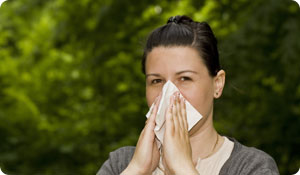
Are the heat of your summer allergies more than you can bear? As summer winds to a close, if there's no sign of your allergies cooling down, you may be one of the 36 million Americans that the American Academy of Allergy, Asthma and Immunology (AAAAI) estimates may suffer from a ragweed allergy.
When Summer Allergies Linger On
When you suddenly find yourself sneezing with itchy eyes, throat and nose in August or September, it's a likely that a ragweed allergy can be to blame for your discomfort. Ragweed is a plant that's very common in rural areas and its pollen can travel quite far. This means you don't need to live in the country to experience the effects of it. Even people who live in cities can suffer from a ragweed allergy.
The season usually starts during the last half of summer and lingers into the fall as late as into November, with ragweed rates peaking sometime in mid-September in many parts of the country. This means that after Labor Day, your symptoms may intensify suddenly and may still continue through Halloween and even beyond.
Warming Up to Ragweed
Global climate changes are also believed to be affecting the magnitude of ragweed today, making the spores more prevalent in the air and also increasing the length of time they pose a challenge for sufferers.
As a result, you'll probably find yourself feeling more sensitive to this trigger and noticing your reaction is magnified and lasts for longer than you might have expected.
Certain times of day may also make you more prone to experiencing ragweed symptoms. This is because the spores are usually at their highest in the air between the hours of 5 and 10 a.m. As a result, you may want to plan to spend your mornings inside with the windows closed, in order to minimize your exposure.
Managing Late-Summer Allergies
There are also some other easy changes you can make to your routine that can help you to manage your ragweed and other late summer allergies. For instance:
- Save outdoor activities for cooler days or immediately following rain, when ragweed and pollen levels are typically lower because many of the spores have been washed away.
- Plan outdoor events and sports for afternoons.
- Minimize your time outside on those warm, windy days when ragweed spores are apt to be prevalent.
- Keep your car windows closed and run the air conditioning.
- Shower and wash your hair and clothes after spending time outside.
- Avoid hanging freshly washed clothes or beach towels hung outside to dry since they may collect ragweed there.
- Pay attention to when your symptoms seem more severe so you can identify patterns that will clue you in to take allergy control medication, such as an antihistamine or corticosteroid nasal spray. Your doctor can help you weed through the options that exist to find the best fit for your needs and situation.
When nothing else works, or when you find that your symptoms keep getting more severe, you may want to consider getting such allergy shots to desensitize you to ragweed and other summer allergies.
Sources
American Academy of Allergy, Asthma and Immunology (AAAAI)
http://www.aaaai.org/patients/publicedmat/tips/outdoorallergens.stm
http://www.aaaai.org/springallergy/2006/pollen.asp





